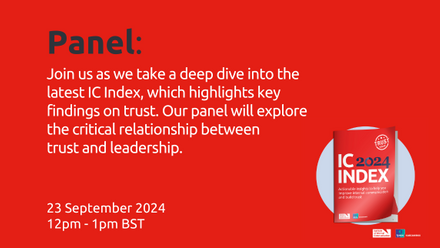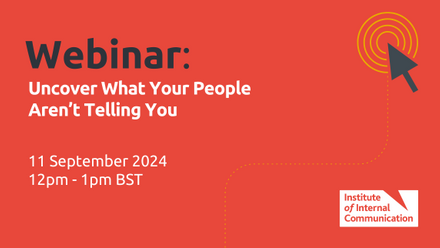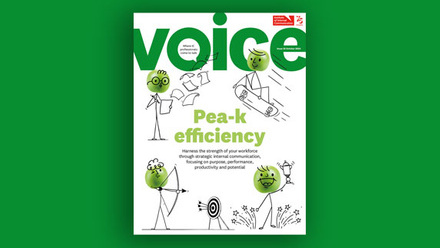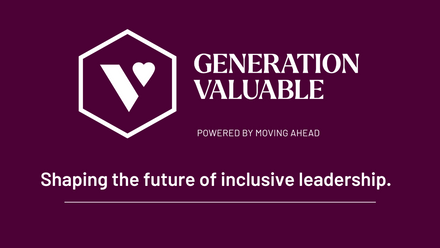In June, the IoIC published the second edition of its IC Index, produced in partnership with Ipsos Karian and Box. This important research explores the impact of internal communication on organisational performance and effectiveness.
This year, researchers surveyed 4,000 people working in the UK to expose headline insights for internal communicators. The data highlights the critical role of trust at work in boosting morale, motivation, engagement and results.
The findings of the IC Index underscore the crucial role of internal communication within organisations, not least as they attempt to navigate the continuous change that continues to define the tumultuous 2020s.
2024’s IC Index – launched in June – reveals some compelling truths about what modern workers want and expect from their employers.
And more importantly, what they need from their internal communication function.
As uncertainty looms large across so many aspects of 21st century life, this important piece of research, undertaken by the IoIC in partnership with Ipsos Karian and Box, shows just how vital authenticity and empathy at work have become.
Poignantly, the research underscores the critical role internal communication plays in building and nurturing trusted relationships at work. Trust drives workplace engagement, wellbeing, performance and, ultimately over the longer term, an organisation’s ability to sustain itself.
Where internal communication is rated as excellent, the data shows levels of trust in leadership are much higher and that people are more likely to stay with the organisation for longer. Even when an organisation has been through significant change, good communication protects this trust.
How we communicate matters.
Here at the IoIC, we believe communication is the bedrock of organisational resilience in turbulent times. It’s the most powerful enabler of trust, and when we demonstrate heartfelt, humane, inclusive and respectful communication, it presents a potent antidote to the stressful, turbulent and increasingly incomprehensible nature of our times.
But to optimally use our internal communication skillset to nurture trust at work, we first need to understand what it is we’re dealing with.
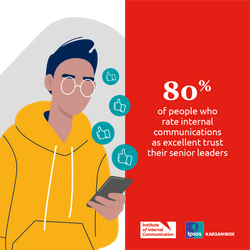
What is trust and why does it matter?
“Trust impacts us 24/7, 365 days a year. It undergirds and affects the quality of every relationship, every communication, every work project, every business venture, every effort in which we are engaged. It changes the quality of every present moment and alters the trajectory and outcome of every future moment of our lives – both personally and professionally.”
Steven Covey, The Speed of Trust
While we’ve seen a huge rise in conversations about trust in recent years, it remains challenging to find one single, widely understood definition of trust. Every online dictionary offers something slightly different.
One reason for this is that, as researcher and best-selling author Brené Brown writes, trust is more of a cognitive assessment than an emotion. This makes it subjective, context-specific and hyper-personal.
Our capacity to trust is determined by our life experience and the extent to which we have been able to trust others in the past. Or, conversely, the extent to which we have been let down. As each and every one of us experiences the world and relationships in a unique way, no wonder it’s hard to find consensus on what trust is.
Nonetheless, a shared understanding of the words we use is essential. For the purposes of this piece, let’s use the definition of trust that Jennifer Sproul recently offered in an opinion piece. It comes from trust researcher and expert, Rachel Botsman, who says:
“Trust enables us to feel confident enough to take risks and open ourselves up to being vulnerable”.
Trust and vulnerability
Allowing ourselves to feel vulnerable is almost impossible if we feel threatened. And with so many urgent and complex challenges in the mix these days, latent stress and anxiety at work have become the norm, rather than the exception. As such, having the courage to experiment, risk being wrong and face the threat of ridicule, or worse, sanctions is simply not worth the gamble.
But this is dangerously bad timing for business. Like never before, organisations need to innovate, evolve, adapt and futureproof their products and services as well as their internal processes and modes of operation. The twin challenges of increasingly sophisticated enterprise-grade AI and the burgeoning climate crisis demand new ways of working that leverage the best of what both technology and humans have to offer and in tandem reduce carbon emissions.
In short, we need to create and nurture inclusive and psychologically safe work environments. Organisations must hone working conditions that, regardless of location, encourage curiosity, collaboration, diversity of thinking and the willingness to explore the unknown.
Trust and psychological safety
Harvard business professor Amy Edmonson defines psychological safety as “a shared belief held by members of a team that it’s OK to take risks, to express their ideas and concerns, to speak up with questions, and to admit mistakes — all without fear of negative consequences.”
How can organisations create psychologically safe work environments?
We believe the IC Index 2024 demonstrates that world-class internal communication is a crucial building-block. When we leverage the core skills of empathic listening and respectful, inclusive discourse, relationships build and trust deepens. As intra-organisational bonds deepen, reciprocity and collaboration naturally abound. People are hardwired to be helpful and of service to those with whom they feel affinity and loyalty.
This is perhaps new work for the internal communication profession, but stepping up to nurture community-building at work is a surefire way to deliver strategic value to our senior stakeholders and colleagues. Indeed, the capacity to do so is a vital enabler of organisational resilience itself.
Further recommended reading
-
Covey, S. & Merrill, R. (2008). The Speed of Trust: The One Thing that Changes Everything. New York: Free Press
-
Brown, B. (2021). Atlas of the Heart: Mapping Meaningful Connection and the Language of Human Experience. London: Penguin Random House
-
Botsman, R. (2017). Who Can You Trust? How Technology Brought Us Together – and Why It Could Drive Us Apart. London: Penguin Random House
-
https://hbr.org/2023/02/what-is-psychological-safety

